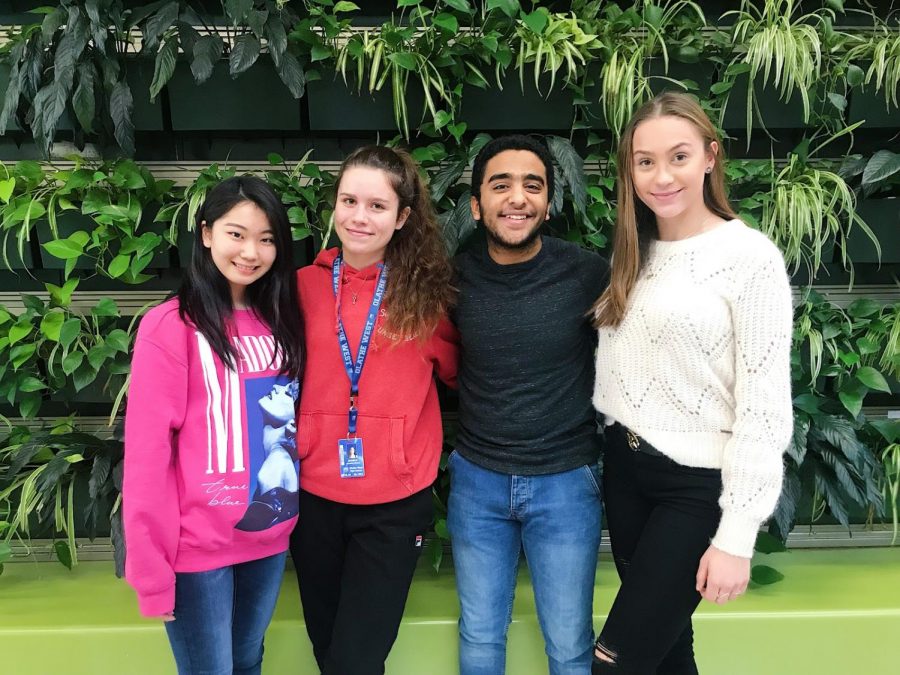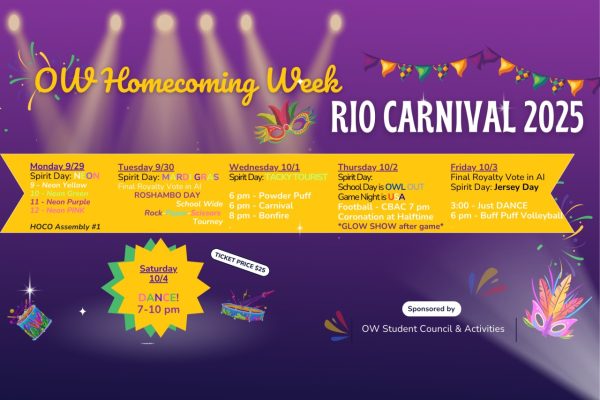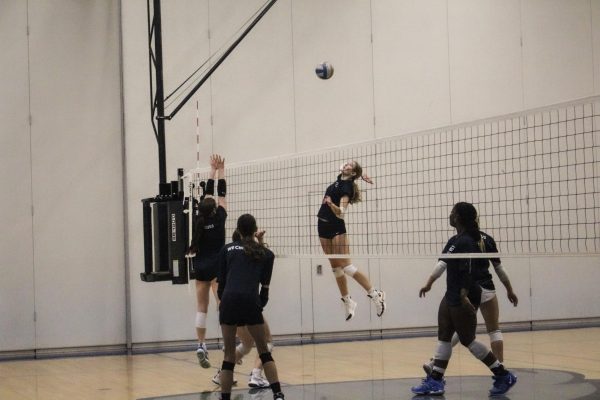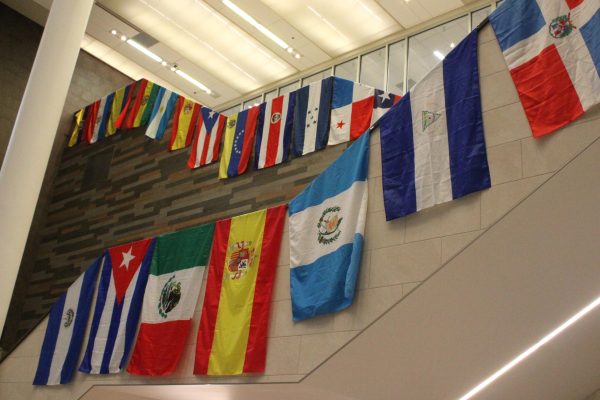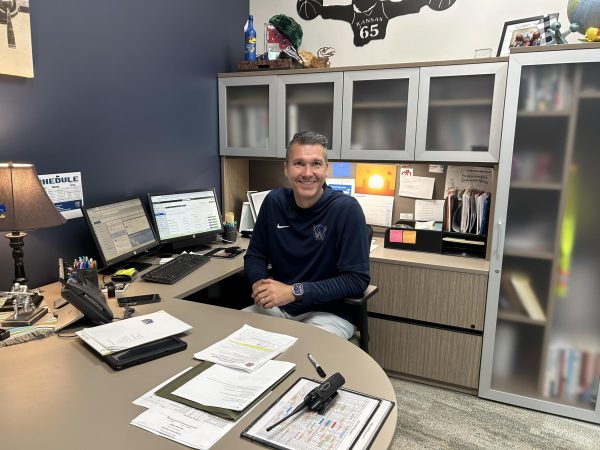Adventure to the United States
4 Kids, 3 Continents, 1 School
Foreign exchange students from Olathe West stand together for photo. Karen Fukami (Far left) Monica Almagro, Maged Wadi, and Sarah Mari Nielsen (Far right.)
Karen Fukami, Monica Almagro, Maged Wadi, and Sarah Mari Nielsen, are from different cities in different countries. They have different backgrounds, stories, ideas, experiences and eat very different things for breakfast. Now, they sit in Kansas City, the center of the United States, and discuss these things enthusiastically with each other. The fact that each one of them curiously made a decision to leave their homes and step into something different and unfamiliar now brings them together. These four kids are Olathe West’s foreign exchange students.
Families
First, the students talked about what’s closest to them, their families. Karen Fukami lived in Tokyo, Japan with her mom and dad, that she describes as very hardworking. Her house was in the middle of the bustling city Tokyo. Maged Wadi also lived in the center of a busy city, except in Giza, Egypt. He lived in an apartment like most people do in Giza, about 20 minutes away from the pyramids, with his mom who is a stay-at-home wife, and his dad who is a post officer.
“I didn’t stay home a lot though,” Wadi said “We [his friends] usually went to play soccer.”
Monica Almagro and Sarah Mari both recall living in small towns just outside of big cities Madrid and Copenhagen. They both say it was common for them and their friends to take the bus to their big cities at least once a week.
“My town is in the rural area in Madrid. I usually go to the center of Madrid every week by bus.” Almagro said.
Almagro from Spain, and Mari from Denmark, have the most similarities out of the four kids, being from the same continent. Mari explains that she lived in a small apartment, but shortly after she came to America, her family bought a new house that she hasn’t got to see yet. She says “I lived in an apartment that was really small. Me and my brothers had to share a bathroom. But now they bought a house and I don’t know how the house is.”
Host Families
Second, the kids compare their host homes and families to their previous homes and families. All four agreed that their host families treat them very well. Almagro lives with two twins, Carson and Kennedy. Carson is her age and she says it’s like having the brother she never had back in Spain. Her host parents are close with her as well.
“I talk with them about everything and they are always listening to me and taking care of me. They worry about me like if I’m okay and if I have everything I need. It’s really like they are my family,” Almagro said.
She has a sister in college back in Spain who she shares a room with, and while they are best friends, Almagro jokingly admitted that her sister probably enjoys having their room all to herself.
Maged Wadi and Karen Fukami both have the same experience in the United States, of learning to be older siblings to younger host siblings. Both were only children in their home countries. Wadi says “It is my new experience to be an older brother, and I’m really enjoying it.”
Mari’s view on her host family is unique considering her family in Denmark is split. “My parents have been divorced since I was like five so I can’t remember how it is to have a family that is together, and it is so nice to meet a family that is together,” said Mari.
She lives with a host family, the Buis, who are Vietnamese, and so she gets to experience two different cultures. One time in particular, Mari FaceTimed her mom in Denmark and let her talk to her host mom while she translated for them both.
“They were a lot alike, and laughed the whole time,” Mari said.
School Systems
Don’t get these kids started on the difference in school systems between the U.S. and their countries. They have more than enough to say. For starters, they all agreed that their countries’ high schools do not have sports teams, theatre, or extra activities. Their home countries’ schools focus on studying core subjects, and if one wants to play a sport or do an activity, they would have to join a club or do it on their own. Wadi, for example plays soccer as a part of a club and not his school, who does not offer that option.
“Here, having fun is more important than study. In Spain, they don’t care about that. If you want to play a sport, you have to do to a club and buy your own stuff,” Almagro said.
All said that football games and school spirit at Olathe West were some of their favorite things and experiences about American high school. They also agreed that the National Anthems in their countries aren’t played as much as in the U.S and would almost never be played at a high school event. School Mascots are also non-existent.
Aside from school spirit, there are also other big differences in schools across the globe. Fukami explains that in Japan, children go to elementary school for six years, middle school for three years, and high school for three years. Almagro also said in Spain she had been going to high school for four years and she still has two more.
Fukami also says she was surprised at the amount of discussions that there are in American classrooms. “[In Tokyo] Students will sit in the table and chairs and just take notes. Students are serious during class and it’s really easy to fall asleep, but here I can not fall asleep because we’re always having discussions,” she said.
However, Mari and Almagro said the opposite about their schools. They both said that in Copenhagen and Madrid, classrooms are a lot louder than in the U.S. Almagro also mentioned that the teachers weren’t as passive as teachers here. “If a teacher wants you to be quiet there, they will just turn to you and say ‘would you shut up,’” she says.
All four kids agreed that school, studying wise, is much easier here in the U.S. Wadi said “I took about nine subjects to really study in Egypt, and here I take about four to really study and the rest are just for fun. So it’s easy for me and I really like that. I don’t have to study a lot, just enjoy the time.”
Almagro said the same thing, except that she thought it was better in Spain that school was harder because it prepares you for real life. She said, “In Spain, if you don’t study, you will probably fail all your classes, but here if you don’t study you might still pass.”
Mari says that it’s very different in Denmark because in elementary and middle school you take different classes to figure out what you like and then you pick a high school based on that thing. There are separate high schools for art, business, math and science, and other categories as well. She wants to be a lawyer, and when she goes back to Copenhagen she will attend a high school specifically for business and law. This is similar to college in the U.S.
Other Experiences
Wadi says that being in Kansas has been the first time he’s ever seen snow and he loves it. It’s also been the first time the kids have celebrated Thanksgiving and they all were looking forward to trying traditional foods like pumpkin pie, stuffing, and even mashed potatoes. Almagro says she can’t believe how early Americans start celebrating Christmas. Wadi, Fukami, and Mari all agree.
“We celebrate Christmas, but you guys start listening to music several months early,” Almagro said. Wadi says in Egypt there isn’t specific music for Christmas and he didn’t know what Christmas music was until he got here.
Talking with these kids could make one want to get out and experience different cultures and cities around the world. Every city they described sounded completely intriguing despite being on completely different continents. Getting to know them gives you a different perspective on the U.S. and countries across the globe.



